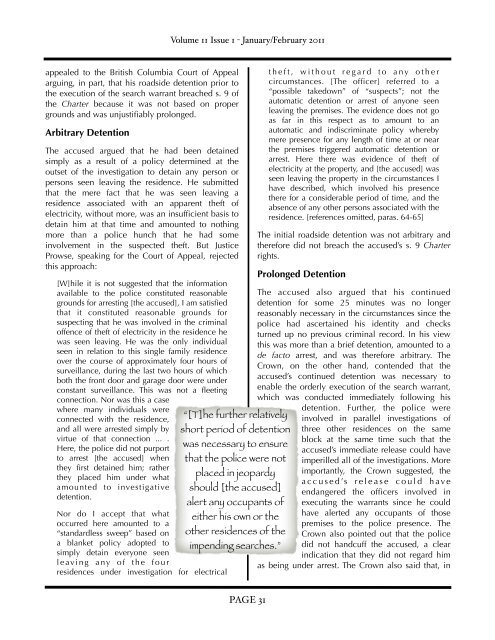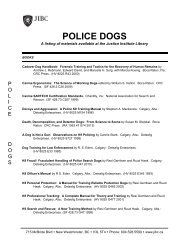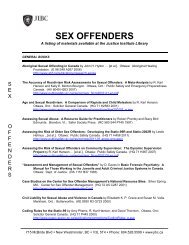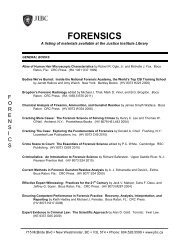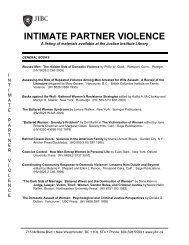legally speaking - Justice Institute of British Columbia
legally speaking - Justice Institute of British Columbia
legally speaking - Justice Institute of British Columbia
You also want an ePaper? Increase the reach of your titles
YUMPU automatically turns print PDFs into web optimized ePapers that Google loves.
appealed to the <strong>British</strong> <strong>Columbia</strong> Court <strong>of</strong> Appeal<br />
arguing, in part, that his roadside detention prior to<br />
the execution <strong>of</strong> the search warrant breached s. 9 <strong>of</strong><br />
the Charter because it was not based on proper<br />
grounds and was unjustifiably prolonged.<br />
Arbitrary Detention<br />
The accused argued that he had been detained<br />
simply as a result <strong>of</strong> a policy determined at the<br />
outset <strong>of</strong> the investigation to detain any person or<br />
persons seen leaving the residence. He submitted<br />
that the mere fact that he was seen leaving a<br />
residence associated with an apparent theft <strong>of</strong><br />
electricity, without more, was an insufficient basis to<br />
detain him at that time and amounted to nothing<br />
more than a police hunch that he had some<br />
involvement in the suspected theft. But <strong>Justice</strong><br />
Prowse, <strong>speaking</strong> for the Court <strong>of</strong> Appeal, rejected<br />
this approach:<br />
[W]hile it is not suggested that the information<br />
available to the police constituted reasonable<br />
grounds for arresting [the accused], I am satisfied<br />
that it constituted reasonable grounds for<br />
suspecting that he was involved in the criminal<br />
<strong>of</strong>fence <strong>of</strong> theft <strong>of</strong> electricity in the residence he<br />
was seen leaving. He was the only individual<br />
seen in relation to this single family residence<br />
over the course <strong>of</strong> approximately four hours <strong>of</strong><br />
surveillance, during the last two hours <strong>of</strong> which<br />
both the front door and garage door were under<br />
constant surveillance. This was not a fleeting<br />
connection. Nor was this a case<br />
where many individuals were<br />
connected with the residence,<br />
and all were arrested simply by<br />
virtue <strong>of</strong> that connection ... .<br />
Here, the police did not purport<br />
to arrest [the accused] when<br />
they first detained him; rather<br />
they placed him under what<br />
amounted to investigative<br />
detention.<br />
Nor do I accept that what<br />
occurred here amounted to a<br />
“standardless sweep” based on<br />
a blanket policy adopted to<br />
simply detain everyone seen<br />
l e av i n g a ny o f t h e f o u r<br />
residences under investigation for electrical<br />
Volume 11 Issue 1 - January/February 2011<br />
“[T]he further relatively<br />
short period <strong>of</strong> detention<br />
was necessary to ensure<br />
that the police were not<br />
placed in jeopardy<br />
should [the accused]<br />
alert any occupants <strong>of</strong><br />
either his own or the<br />
other residences <strong>of</strong> the<br />
impending searches.”<br />
PAGE 31<br />
t h e f t , w i t h o u t r e g a r d t o a n y o t h e r<br />
circumstances. [The <strong>of</strong>ficer] referred to a<br />
“possible takedown” <strong>of</strong> “suspects”; not the<br />
automatic detention or arrest <strong>of</strong> anyone seen<br />
leaving the premises. The evidence does not go<br />
as far in this respect as to amount to an<br />
automatic and indiscriminate policy whereby<br />
mere presence for any length <strong>of</strong> time at or near<br />
the premises triggered automatic detention or<br />
arrest. Here there was evidence <strong>of</strong> theft <strong>of</strong><br />
electricity at the property, and [the accused] was<br />
seen leaving the property in the circumstances I<br />
have described, which involved his presence<br />
there for a considerable period <strong>of</strong> time, and the<br />
absence <strong>of</strong> any other persons associated with the<br />
residence. [references omitted, paras. 64-65]<br />
The initial roadside detention was not arbitrary and<br />
therefore did not breach the accused’s s. 9 Charter<br />
rights.<br />
Prolonged Detention<br />
The accused also argued that his continued<br />
detention for some 25 minutes was no longer<br />
reasonably necessary in the circumstances since the<br />
police had ascertained his identity and checks<br />
turned up no previous criminal record. In his view<br />
this was more than a brief detention, amounted to a<br />
de facto arrest, and was therefore arbitrary. The<br />
Crown, on the other hand, contended that the<br />
accused’s continued detention was necessary to<br />
enable the orderly execution <strong>of</strong> the search warrant,<br />
which was conducted immediately following his<br />
detention. Further, the police were<br />
involved in parallel investigations <strong>of</strong><br />
three other residences on the same<br />
block at the same time such that the<br />
accused’s immediate release could have<br />
imperilled all <strong>of</strong> the investigations. More<br />
importantly, the Crown suggested, the<br />
a c c u s e d ’s r e l e a s e c o u l d h a v e<br />
endangered the <strong>of</strong>ficers involved in<br />
executing the warrants since he could<br />
have alerted any occupants <strong>of</strong> those<br />
premises to the police presence. The<br />
Crown also pointed out that the police<br />
did not handcuff the accused, a clear<br />
indication that they did not regard him<br />
as being under arrest. The Crown also said that, in


